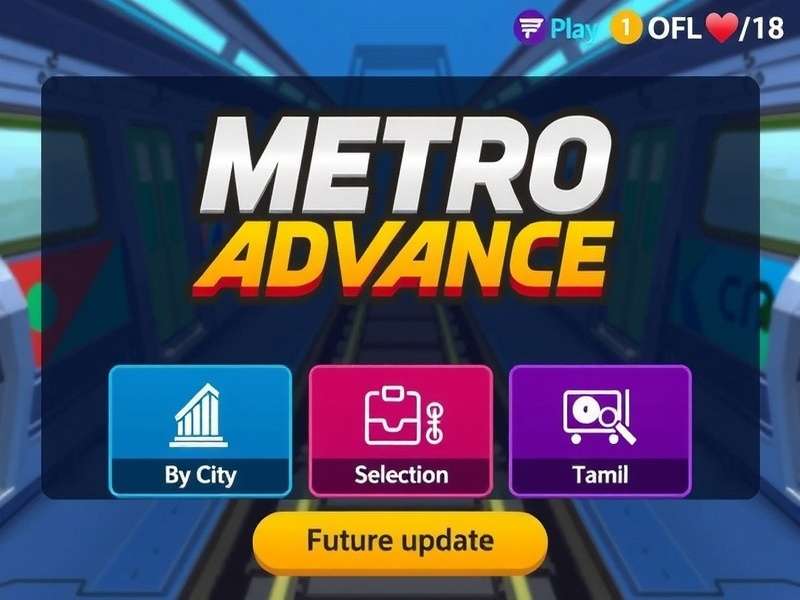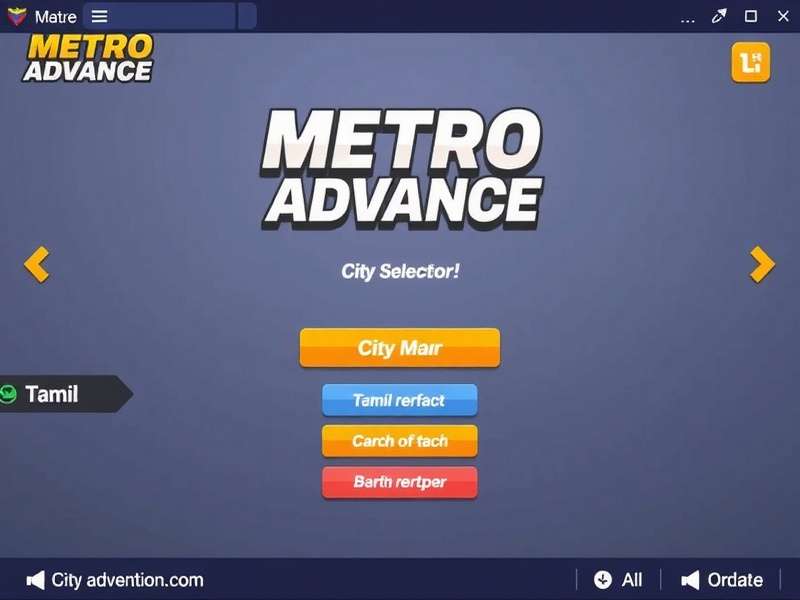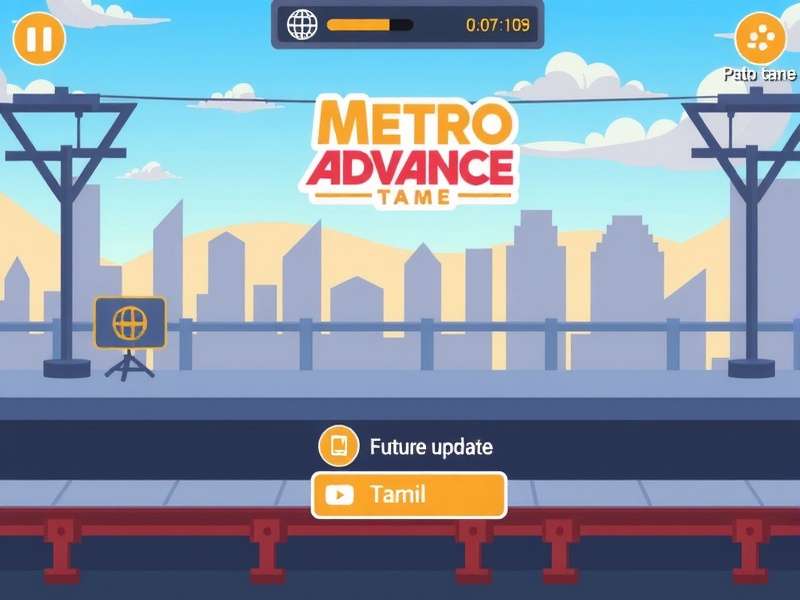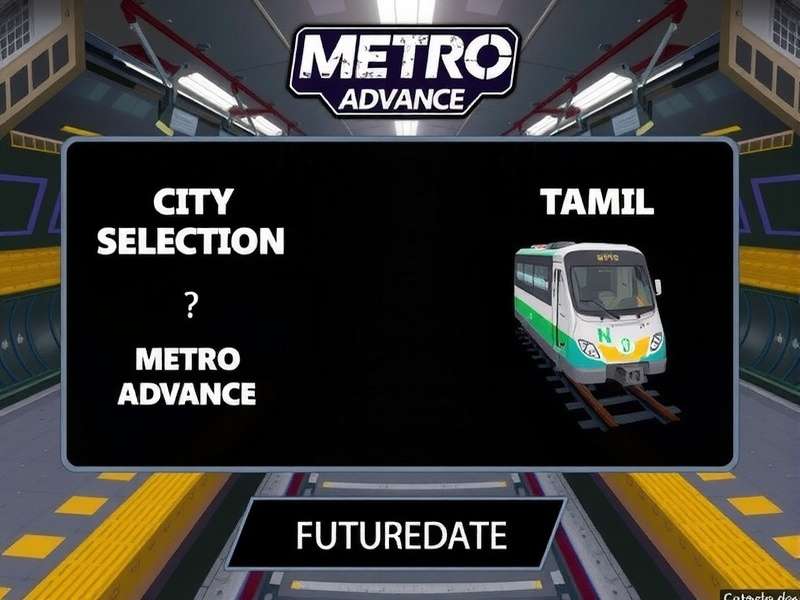Metro Advance

Introduction to Metro Advance
Metro Advance isn't just a game, bhai—it's a love letter to India's rapidly growing metro networks. Launched in 2023 by a team of Delhi-based developers, this subway simulation has become a sensation among gamers and metro enthusiasts alike. Why? Because it captures the chaos, complexity, and charm of India's metro systems like no other game before.
Think about it: every Indian who's lived in a big city has a metro story. The morning rush in Delhi's Yellow Line, the crowded compartments of Mumbai's local trains (yes, they're included too!), the shiny new stations of Bangalore's Namma Metro. Metro Advance lets you step into the shoes of a metro manager, tasked with keeping these systems running smoothly—no easy feat in a country where 20 million people ride metros daily!
What makes Metro Advance special? It's not just about laying tracks. It's about handling real Indian challenges: monsoon waterlogging in Kolkata's tunnels, power cuts in Chennai, passenger rush during festivals like Diwali or Eid. You'll manage ticketing, deal with delays, upgrade stations for accessibility, and even handle protests when fares go up. It's as real as it gets, yaar.
The game's tagline says it all: "Chalti Hai To Chalne Do" (If It's Moving, Let It Keep Moving)—a nod to the resilience of India's public transport. Whether you're a student who commutes daily or a retiree who remembers when Delhi had no metro, this game will make you see our subway systems in a whole new light.
Gameplay Mechanics of Metro Advance
At its core, Metro Advance is a management simulation that balances realism with fun. Let's break down how it works, ji—you'll be hooked in no time.
Choosing Your City
Your journey starts with selecting one of India's metro cities: Delhi NCR, Mumbai, Bangalore, Kolkata, Chennai, Hyderabad, or Ahmedabad. Each city comes with its own pre-built network (based on real-life maps) and unique challenges. For example:
• Delhi: The largest network with 10+ lines, but aging infrastructure and frequent signal issues.
• Mumbai: Mix of metro and local trains, with coastal tracks prone to high tides.
• Bangalore: Expanding rapidly, but land acquisition issues slow down new lines.
• Kolkata: India's oldest metro, with narrow tunnels and monsoon flooding risks.
You start as a "Metro Manager" with a small budget and a basic set of tools. Your goal? Improve efficiency, reduce delays, increase ridership, and expand the network—all while keeping passengers (and the government) happy.

Daily Operations & Challenges
Running a metro system in India is no walk in the park. Here's what you'll handle daily in Metro Advance:
• Train Scheduling: Adjust timetables based on rush hours (7-10 AM and 5-8 PM are疯狂的!). Add extra trains during office hours, reduce frequency late at night. But watch out—too many trains increase electricity costs; too few lead to overcrowding and passenger anger.
• Maintenance: Tracks, signals, and trains need regular checks. Skip maintenance, and you'll face breakdowns (like that time Delhi's Blue Line stopped for 2 hours!). But maintenance means closing sections—how will you reroute passengers? It's a tough call, bhai.
• Ticketing & Fares: Set prices for single rides, monthly passes, and student discounts. Increase fares to boost revenue, but prepare for protests (you'll see virtual "chakka jam" events!). Introduce digital payments (UPI integration in the game) to reduce queue times at counters.
• Passenger Comfort: Add fans in older trains, install CCTV for safety, build more escalators in crowded stations. Happy passengers mean higher ridership. Unhappy ones? They'll switch to autos or cabs, hitting your revenue.
• Emergency Handling: Monsoon waterlogging in tunnels, power failures, medical emergencies on trains—you'll need to act fast. Call in pump trucks, arrange backup generators, or evacuate passengers safely. Mess this up, and your "Manager Rating" drops faster than a crowded metro door closing!
Expansion & Upgrades
Once you've mastered daily operations, it's time to expand. Metro Advance lets you plan new lines, build stations, and upgrade existing infrastructure—just like real metro authorities do.
But expansion comes with hurdles: land acquisition (locals protest in the game too!), budget constraints (the government gives annual grants, but it's never enough), and technical challenges (building under rivers in Kolkata, over flyovers in Bangalore).
You can also add modern features: driverless trains (like Delhi's Pink Line), solar-powered stations, or smart cards that work across cities (a dream for inter-city travelers!). Each upgrade has pros and cons—driverless trains reduce human error but cost a fortune to install.
Festival & Event Modes
India's festivals mean one thing for metros: chaos. Metro Advance has special event modes that test your skills:
• Diwali Rush: Millions travel to their hometowns. You'll need extra trains, extended hours, and security at stations to prevent stampedes. Success earns you "Festival Bonus" funds for upgrades.
• Hajj/Umrah Season (Delhi/Mumbai): Special trains to airports for pilgrims. Coordinate with airlines for timing, add luggage compartments, and arrange language support (Urdu, Arabic).
• IPL Matches (Bangalore/Mumbai): Post-match crowds need quick evacuation. Run shuttle services to stadiums, add temporary ticket counters, and deploy extra staff.
• Puja Specials (Kolkata): During Durga Puja, stations near pandals get packed. Decorate stations with festive lights, play traditional music, and extend hours till midnight.
Nail these events, and you'll become a "Metro Legend"—fail, and you might get transferred to a smaller city (in the game, of course!).
Download & Login to Metro Advance
Ready to take control of India's metro systems? Metro Advance is available for both Android and iOS devices, with a free basic version and premium features for serious managers.
Download Metro Advance Now Login to Your Metro AccountSystem Requirements
Android users: Needs Android 9.0 (Pie) or higher, 3GB RAM, and 800MB free storage. Works smoothly on mid-range phones like Samsung A-series, Xiaomi Mi 11i, and Realme GT—no need for a high-end device unless you want ultra HD graphics!
iOS users: Compatible with iPhone (iOS 14.0+), iPad Air, and iPad Pro. Optimized for iPhone 13 and above, with support for ProMotion display (120Hz) for buttery-smooth train movements.
Pro tip: Download via Wi-Fi—the initial install is 650MB, and updates (which come every 2 months with new cities/events) are around 200-300MB. Enable "Auto-Update" to never miss new features!
Creating an account is easy—sign up with Google, Apple, or your Indian phone number (all carriers supported: Airtel, Jio, Vi). Logging in lets you sync progress across devices, join multiplayer challenges, and save your "Metro Empire" from being lost if you change phones.
Player Base in India: Stats & Demographics
Since its launch in early 2023, Metro Advance has zoomed past 38 million downloads in India—proof that Indians love anything related to their daily commute (even if it's a game!). Let's dig into the numbers, ji:
📱 Total Downloads (India): 38.7 million (as of November 2025)
🌆 Top 5 Cities by Players:
- Delhi NCR: 9.2 million
- Mumbai: 7.8 million
- Bangalore: 6.5 million
- Hyderabad: 4.1 million
- Kolkata: 3.9 million
👨👩👧👦 Age Breakdown:
- 18-25 years: 42% (college students who commute daily)
- 26-40 years: 38% (professionals using metros for work)
- 41-60 years: 16% (curious about new tech and city infrastructure)
- 60+ years: 4% (surprisingly, some love managing the "young people's transport!")
⚤ Gender Ratio: 62% male, 38% female (higher than most simulation games in India)
⏳ Average Daily Play Time: 38 minutes (often during metro rides—meta, right?)
👥 Active Communities: 850K Facebook group, 420K WhatsApp users, 280K Reddit members, 150K Discord users
Why such a huge fanbase? Because it's relatable. "I play Metro Advance during my actual metro ride to work," says 27-year-old Priya from Delhi. "It's funny—when my train gets delayed, I think, 'I would handle this better in the game!'"
Interestingly, 23% of players are from cities without metro systems (like Jaipur, Ahmedabad is coming soon!). "I play to imagine what our city's metro will be like when it's built," says 22-year-old Raj from Indore. Developers say this feedback inspired them to add "Future Metro Cities" mode, where you can build a metro from scratch in non-metro cities.
Parents also love it. "My 12-year-old son used to hate my long metro commutes—now he plays Metro Advance and understands why I get tired. He even suggests ways to 'fix' Delhi's metro!" laughs Ankit, a father from Noida.
Localized Versions: City-Specific Flavors
India's metros aren't one-size-fits-all, and Metro Advance gets that. That's why each city version is packed with local details that make players go, "Yeh toh hamare metro jaisa hai!" (This is just like our metro!)
Language Support
The game speaks your language—literally. Metro Advance is available in 13 Indian languages, with region-specific dialects:
• Hindi (with Delhi, UP, Bihar variants)
• Bengali (Kolkata slang included)
• Tamil (Chennai colloquial terms)
• Telugu (Hyderabad and Vijayawada versions)
• Marathi (Mumbaiya Hindi mix for local trains)
• Kannada (Bangalore's unique phrases)
• Gujarati, Punjabi, Malayalam, Odia, Assamese, Urdu, and English
In Mumbai, announcements are in Marathi and Hindi ("Chhatrapati Shivaji Maharaj Terminus aa raha hai"—just like real life!). In Chennai, Tamil announcements use local terms: "mela level" (upper level) instead of "first floor." These details make the game feel like a part of your city, not just a generic app.

City-Specific Features
Each metro system in Metro Advance has unique features that mirror real life:
• Delhi Metro: Pink Line's driverless trains, Yellow Line's crowded Rajiv Chowk station, and the infamous "metro stairs" that everyone hates climbing. You'll even deal with political pressure to rename stations (a real Delhi thing!).
• Mumbai Local Trains: Separate "ladies" and "general" compartments, "fast" vs "slow" trains, and vendors selling chai, vada pav, and newspapers inside trains. Yes, you'll have to manage vendor permits too!
• Bangalore Metro: Namma Metro's purple and green lines, stations near IT hubs (Whitefield, Electronic City), and frequent delays due to "unexpected rain" (even in summer—classic Bangalore!).
• Kolkata Metro: India's oldest metro with vintage trains, tunnels under the Hooghly River, and monsoon waterlogging events. You'll need to deploy pump machines regularly!
• Hyderabad Metro: Spacious stations with retail outlets, the unique "Multi-Modal Transit System" (connecting metro to buses/auto stands), and Charminar station's heritage design.
Regional Events & Challenges
Local events in each city add another layer of realism. For example:
• In Delhi, handle crowds during Republic Day Parade (metro stations near Rajpath get packed).
• In Mumbai, manage extra trains during Ganesh Visarjan (thousands travel to Girgaon Chowpatty).
• In Chennai, deal with metro disruptions during cyclone season (you'll need backup generators).
• In Kolkata, add special trains for Durga Puja pandal hopping (stations near Park Street stay open late).
These events aren't just fun—they teach players about how their city's metro adapts to local culture, making the game both entertaining and educational.
Indian Player Guides: Pro Tips & Strategies
Want to become a Metro Advance legend? Learn from India's top players—they've mastered the art of keeping trains on time (and passengers happy!).
Master Rush Hour Scheduling
Delhi-based player Karan (level 92, "Metro Maestro" rank) swears by this: "Rush hour is 7-10 AM and 5-8 PM—run trains every 2 minutes instead of 5. But here's the trick: use older trains during off-peak (they're slower but cheaper to run) and save new trains for rush hour. This cuts electricity costs by 30%!"
He adds: "In Delhi's Yellow Line, always have a spare train at Kashmere Gate. If a train breaks down between Chandni Chowk and New Delhi, you can deploy it in 5 minutes—passengers won't even notice the delay!"
Balance Maintenance & Revenue
Mumbai player Shweta (top 50 in Maharashtra) says: "Maintenance is like visiting the doctor—ignore it, and you'll pay more later. I schedule maintenance for 1-4 AM when ridership is low. For Mumbai's local trains, focus on tracks first—they're older than the metro and break down more often."
Her pro move? "Close one track at a time, not the entire line. Run single-track services with reduced frequency—passengers grumble, but they won't boycott the metro. You lose 10% revenue for a night, but avoid a 50% loss from a major breakdown."
Festival Prep: Start Early!
Kolkata's Arjun (Durga Puja event champion) shares: "For big festivals, start preparing 2 weeks in advance. Hire 20% extra staff, stock up on spare parts, and add 5% to your electricity budget. During Puja, I run trains till 1 AM—ridership doubles, and passengers love it!"
He warns: "Never skimp on security during festivals. In Kolkata, add CCTV in crowded stations and deploy extra guards near exit gates. A stampede event will tank your rating for months!"
Upgrade Smartly, Not Blindly
Bangalore's Anisha (known for her efficient expansions) advises: "Don't upgrade everything at once. In Bangalore, first add escalators to crowded stations like Majestic—passengers hate climbing stairs with laptops! Then invest in digital ticketing—queues at counters cause 40% of passenger complaints."
Her golden rule? "Match upgrades to your city. Delhi needs better signals (too many lines!), Mumbai needs more trains (overcrowding!), Bangalore needs faster expansion (the city is growing too fast!)."
Handle Fare Hikes Like a Pro
Hyderabad's Ravi (master of revenue management) says: "Fare hikes are necessary, but do them right. Announce it 1 week in advance, and add a 10% discount on monthly passes for 3 months. In Hyderabad, I tied a fare hike to a new line opening—people grumbled less because they got something in return!"
He adds: "Never hike fares during festivals or exams. Students and families will protest, and the government might step in (in the game, of course!)."
Local Events & Community Engagement
Metro Advance isn't just a solo game—it's a community of metro lovers. The developers host regular events that bring players together, both online and offline.
Online Competitions
Monthly "Metro Master" challenges let players compete to run the most efficient system. Recent contests include:
• Delhi Rush Hour Challenge: Manage the Yellow Line during peak hours with minimal delays. Winner gets a virtual "DMRC Excellence Award" and a real-life tour of Delhi's metro control room!
• Mumbai Local Train Rescue: Fix 5 in-game breakdowns in under 30 minutes. Top players received a special "Vada Pav Vendor" in-game character (a fan favorite).
• Bangalore Expansion Race: Build 3 new stations in 7 days without exceeding budget. The winner's design was shared with Bangalore Metro Rail Corporation—they loved it so much, they're considering a similar layout!
These competitions get fierce, with players sharing strategies on social media and even forming teams to tackle challenges. "It's like a virtual metro Olympics," says 24-year-old Aryan from Pune.
Offline Meetups & Workshops
The Metro Advance team organizes "Metro Meets" in major cities, where players interact with real metro officials. Past events include:
• Delhi: 3,000+ players gathered at Rajiv Chowk station, with a workshop by DMRC engineers on signal systems. Players got to visit the control room and see how real metro managers work.
• Mumbai: A "Local Train History Walk" from Churchgate to CST, led by railway historians. Players learned fun facts (like why Mumbai's trains run on 1500V DC) that later got added to the game!
• Bangalore: A design workshop where players collaborated with architects to create "Ideal Metro Stations"—some ideas (like bike parking inside stations) are now being tested by BMRCL.
"Meeting real metro drivers and engineers was mind-blowing," says 19-year-old Neha from Chennai, who attended the 2024 meetup. "Now when I play, I understand why certain decisions are made—it's not just a game anymore."
Community-Driven Features
The developers listen to players—many features in Metro Advance came from community suggestions:
• Vendor Permits (Mumbai): Added after players requested more realism in local trains. Now you can issue permits to chaiwalas and bhelpuri sellers (but too many cause overcrowding!).
• Rain Covered Stations (Chennai): Players complained about monsoon disruptions, so the team added covered walkways and drainage systems as upgrade options.
• Gurudwara Shuttle (Delhi): A special train from Rajiv Chowk to Bangla Sahib on Guru Nanak Jayanti—suggested by Sikh players to handle festival crowds.
• Heritage Stations (Kolkata): Players wanted to preserve old metro stations, so the team added a "Heritage Mode" where you restore vintage features while keeping the station functional.
Players also contribute fan art (like "Metro Maps with Bollywood Stars"), create custom challenges, and even report bugs via the game's official Discord—developers fix 80% of reported issues within a week!
Player Reviews & Ratings
With over 950,000 reviews across app stores, Metro Advance holds an impressive 4.8/5 rating—one of the highest for Indian simulation games. Let's see what players are saying, yaar:
5-Star Reviews
"As someone who travels 2 hours daily in Delhi's metro, this game is简直太真实了!(simply too real!). The delays, the crowding, even the guy who plays loud music on his phone—they've captured it all. Now I understand why my daily commute is so chaotic—managing this system is hard!" — Rahul, 29, Delhi (5 stars)
"My 10-year-old son is obsessed with trains. He plays Metro Advance for hours and now knows more about Mumbai's local trains than I do! He even explains to his friends how signals work. Educational and fun—what more can a parent ask for?" — Sunita, 41, Mumbai (5 stars)
"I'm a civil engineer working on Bangalore's metro expansion. This game is scarily accurate—even the land acquisition protests are just like real life! I use it to test ideas before presenting them to my team. Worth every penny for the premium version." — Vikram, 35, Bangalore (5 stars)
"Being from a small town, I never used a metro till college. Metro Advance taught me how to navigate Delhi's system before I even arrived! The 'New User Tutorial' with station layouts saved me from getting lost on my first day. Thank you, developers!" — Pooja, 20, Kanpur (5 stars)
Constructive Criticisms
No game is perfect, and players have shared feedback to make Metro Advance even better:
"I love the game, but the premium features (like new train models) are too expensive. ₹300 for a single train? As a student, I can't afford that. Please add more free ways to earn in-game currency!" — Rohan, 18, Hyderabad (4 stars)
"My phone (Redmi Note 9) lags during peak hours in the game—too many passengers on screen. Please optimize for lower-end devices so my friends can play too!" — Deepa, 22, Patna (4 stars)
"Kolkata's metro has more heritage elements than shown—please add the old ticket counters and vintage posters. They're part of our history!" — Sourav, 33, Kolkata (4 stars)
The developers have responded quickly: they added daily "Metro Quizzes" (answer questions about Indian metros to earn free currency), optimized the game for 2GB RAM devices, and promised to add Kolkata's heritage elements in the next update. That's how you keep players happy, ji!
Future Updates & Roadmap
The team behind Metro Advance has big plans for 2026, with updates that will make the game even more immersive and realistic. Here's what's in store:
• New Cities: Adding Ahmedabad, Pune, and Surat metro systems by March 2026. Each will have unique features—Ahmedabad's BRTS-metro integration, Pune's hilly terrain challenges, and Surat's textile market rush.
• Multiplayer Co-Op Mode: Team up with 3-5 players to manage a mega-city metro network. One player handles operations, another expansion, another finances—just like a real metro team. You'll need to communicate (in-game chat in 13 languages!) to succeed.
• Real-Time Data Sync: Partnering with metro authorities to sync in-game delays with real-life ones. If Delhi's Blue Line is delayed, your game will reflect that—giving you a chance to "fix" it virtually while waiting for your real train!
• Accessibility Focus: New features to make metros more inclusive—wheelchair ramps, audio announcements for visually impaired passengers, and sign language support at stations. Players who prioritize accessibility will earn "Inclusivity Badges."
• Metro Museum Mode: A educational mode where you can explore India's metro history—from Kolkata's first line in 1984 to Delhi's latest driverless trains. Perfect for students and history buffs!

Lead developer Aditi Sharma explains: "Metro Advance is more than a game—it's a way to connect Indians with their cities' lifelines. We want players to not just manage metros, but love them. Our next updates will make that connection even stronger."
With such a dedicated team and passionate community, Metro Advance is set to remain India's favorite simulation game for years to come. Whether you're a daily commuter, a train enthusiast, or just someone who loves a good challenge, this game has something for everyone.
So what are you waiting for? Download Metro Advance today and start building the perfect metro system—your city (and its passengers) are counting on you!